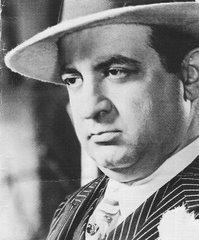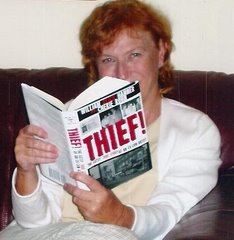
At 79, Frank "Lefty" Rosenthal has departed planet earth... cause: apparent heart attack. The famous odds maker and infamous mob associate now calls the shots in that "sportsbook in the sky" we'll all visit sooner or later.
Back when the mob had teeth, Slick was juiced in as a Stardust Casino BJ dealer by Tony Spilotro. Slick remembers Lefty strutting around in his designer suits whose colors would knock your eyeballs out. One day Slick spotted Lefty and told him that pointy-toed shoes were out. Lefty never uttered a word. The next day somebody tapped Slick on the shoulder. It was Lefty silently pointing to his shoes. They had round toes.
But Slick could never figure out why oddball Lefty set off a bomb in one of the Stardust restrooms. One thing was sure: Lefty played by his own set of rules.
John L. Smith says it best in his obit:
Wednesday, October 15, 2008
Frank "Lefty" Rosenthal - Las Vegas Casino Czar for the Chicago Outfit - Dies in Miami BeachBookmaker and former casino boss Frank "Lefty" Rosenthal died in Florida on Monday at age 79, according to family members and a source at his high-rise condominium complex in Miami Beach, Fla.Rosenthal was a minor celebrity confined to the world of gambling, organized crime and Las Vegas society until the 1995 movie "Casino," which was based on his life story, propelled him to a much higher level of fame — and notoriety.
Rosenthal's passing marks the close of yet another chapter in the transformation of Las Vegas from a gambling destination of ill-repute to a global destination celebrated by everyday tourists, politicians and corporate leaders who invest billions of dollars in resorts.
"He was the innovator and creator of what we know today as the race and sports book in Las Vegas with all the modern accoutrements," said Las Vegas Mayor Oscar Goodman, a former attorney who represented Rosenthal in high-profile scrapes with Nevada regulators, including now-Sen. Harry Reid. "He was an uncanny bettor and won a lot more than he lost."
Goodman painted Rosenthal as the type of boss who represented the best of Las Vegas, in terms of how to run a good casino. "He was the kind of guy who, when working in the casino industry, would see a cigarette butt on the floor, pick it up himself and dispose of it," Goodman said. "And then he'd fire the employee whose job was to have picked it up in the first place."
Rosenthal was also a controversial figure whose life story was entwined with the emergence of Las Vegas as a destination for money mobsters sought to launder through legal casinos.
His childhood was spent learning the gambling trade through illegal bookmaking operations run by organized crime figures from the Midwest. He made connections that fueled his rise and instigated his downfall later in Las Vegas.
Rosenthal was born June 12, 1929, in Chicago and spent the 1930s in Chicago. When he arrived in Nevada in 1968, he discovered that gambling could not only be profitable but a ticket to prominence in a place where his occupation was the subject of reverence, not scorn.
"When I was a kid growing up in Chicago, if you walked around with a ... card in your hand, you were subject to be arrested or harassed, at least," Rosenthal said in 1997 during an interview with the PBS program "Nightline." "On the other hand, if you want to go to Las Vegas, Nevada, you can do the same thing and be quite respectable."
The word "respectable" was a loaded phrase when it came to Rosenthal.
When he moved to Las Vegas, he had already gained some level of notoriety for an appearance in 1961 before a Senate hearing on gambling and organized crime during which he invoked Fifth Amendment protection against self-incrimination 38 times.
An indictment in California in 1971 for conspiracy in interstate transportation in aid of racketeering helped prevent the bookmaker Rosenthal from getting a Nevada gaming license, a situation that angered him for years after he left Las Vegas. A 1963 conviction stemming from an attempt to bribe college basketball players later landed him on a short list of people excluded from Nevada casinos. But lack of a license didn't stop him from holding sway over operations at the Stardust, Hacienda, Fremont and Marina casinos when they were owned or controlled by the Argent Corp., and financier Allen Glick. Glick was the purported front man for Midwestern mob bosses who controlled the casinos through Argent, which was funded in part through loans from the Teamsters union.During an interview with a magazine reporter in 1975, the unlicensed Rosenthal landed himself in hot water with regulators when he said, "Glick is the financial end, but the policy comes from my office."
Rosenthal's problems were exacerbated by personal and business connections to reputed mobster Tony Spilotro.
Spilotro wound up being indicted in a skimming scheme, along with about 14 others, which also sealed Rosenthal's fate with gaming regulators, who ended up putting both men in Nevada's Black Book of persons excluded from casinos.
Spilotro also wound up having an affair with Rosenthal's estranged wife, Geri, a situation law enforcement authorities later claimed as evidence Spilotro tried to kill Rosenthal.
"Obviously there were things going on," Rosenthal told the Fort Lauderdale (Fla) Sun-Sentinel in 1995. "There are more tricks in the trade than I can ever describe to you. But I think some of it (the federal inquiry) was exaggerated."
Later in the Sun-Sentinel story, Rosenthal acknowledged there was little chance he could escape the notorious shadow of Spilotro. "In retrospect, his reputation and the fact that we were boyhood friends — there was no way for me to overcome it," Rosenthal told the newspaper.
Others' suggested that Rosenthal was more than just boyhood friends with rough characters.
The Sun-Sentinel story included claims by Glick that Rosenthal made lethal threats when he didn't get his way.
Glick paraphrased Rosenthal's approach as, "If you interfere with any of the casino operations or try to undermine anything I want to do here ... you will never leave this corporation alive."
But in the end, it was Rosenthal who was on the wrong end of lethal threats.On Oct. 4, 1982, in a parking lot outside a Marie Callendar's restaurant on East Sahara Avenue, Rosenthal turned the key in his Cadillac and ignited a fiery explosion that ruined the car but didn't kill him.
Rosenthal left Las Vegas after the bombing but remained in the headlines throughout the 1980s as the government sorted through the dirty laundry of the Las Vegas gambling industry in myriad court proceedings.
Rosenthal also sought to appeal his spot in the Black Book, an effort that was denied in 1990. At the time then-Gaming Control Board member Gerald Cunningham said allowing Rosenthal back into the business would represent, "a threat to Nevada's gaming industry.
"The 1995 movie, "Casino," directed by Martin Scorcese and starring Robert DeNiro as a Sam "Ace" Rothstein, was essentially an idealized version of Rosenthal and boosted Rosenthal's fame later in life.
He also maintained a Web site that offered gambling "tips and tricks."On Tuesday, Goodman said there was a side to Rosenthal that was largely unknown to moviegoers, gambling regulators and business associates. "What I saw through representing him since 1972 until I was elected a mayor was a different side, a loyal friend and a loving parent who doted over his kids," Goodman said.
Rosenthal himself told the Sun-Sentinel his Las Vegas story was poorly told, especially by those in law enforcement. "Rumors and bull(expletive)," he told the paper. "That's the No. 1 industry in Nevada."

 states at the time--as well as in nine other states. These two states are important because if Nixon had carried both, he would have won the election in the electoral college.
states at the time--as well as in nine other states. These two states are important because if Nixon had carried both, he would have won the election in the electoral college. states at the time--as well as in nine other states. These two states are important because if Nixon had carried both, he would have won the election in the electoral college.
states at the time--as well as in nine other states. These two states are important because if Nixon had carried both, he would have won the election in the electoral college.



